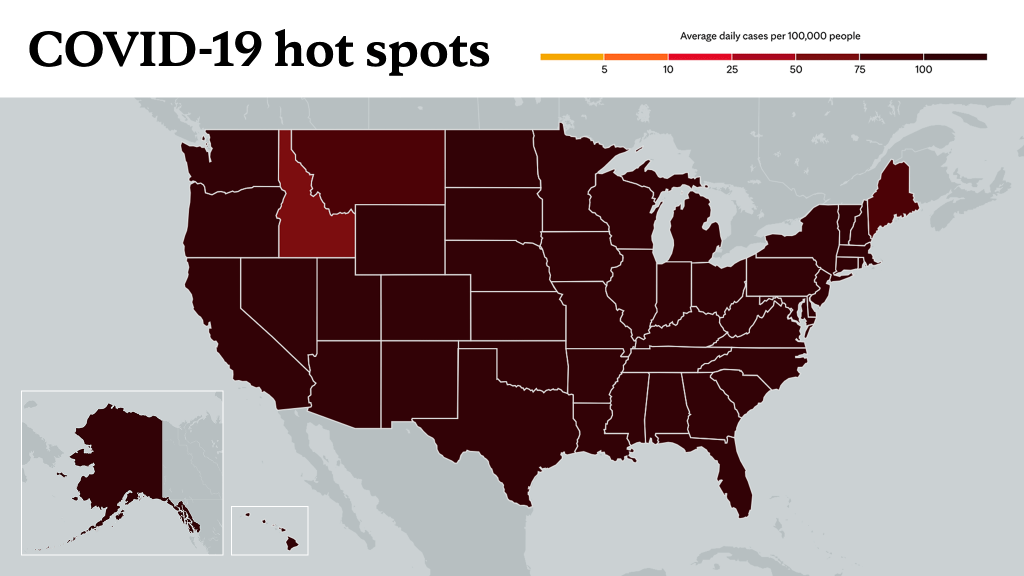-
What will be the future ‘new normal’ with COVID-19?

Jan. 21 marks two years since the first confirmed case of COVID-19 was reported in the U.S. In that time, the nation has made strides to keep the virus in check as much as possible with testing, masking, social distancing, vaccines and other precautionary measures. Despite that fact, nearly 850,000 people in the U.S. have died from COVID-19.
Will living in a pandemic be the "new normal" for everyone in the future? Or will COVID-19 eventually be eradicated? While infectious diseases experts at Mayo Clinic say they don't have a crystal ball, they do expect things to change in the future.
"At the present, we're still in one of the surges of the pandemic — hopefully one of the last — if not the last — major surge. So we're not quite in this new normal phase yet, but we're getting much closer," says Dr. John O'Horo, a Mayo Clinic infectious diseases specialist. "As we move into this new normal, what that really will mean is that this becomes an endemic virus like the flu that just circulates around — worse in certain times of the year in places — and requires some of the same measures that we require for the flu, like having a regular revaccination."
Watch: Dr. John O'Horo talks about the future new normal with COVID-19.
Journalists: Broadcast-quality sound bites are in the downloads at the end of this post. Please courtesy: Mayo Clinic News Network. Name super/CG: John O'Horo, M.D./Infectious Diseases/Mayo Clinic.
While many of the precautionary measures, such as masking, might be relaxed by health officials in this new normal, Dr. O'Horo expects they could be reinstated in the future if surges in COVID-19 cases occur.
"During periods of high transmission, we may see some of these restrictions return that we've been used to in the past two years — like wearing masks in certain settings — depending on local prevalence, strains that are around and the vulnerability of people who are in there. Health care facilities, for example, are going to have a lower threshold for recommending or even requiring masks during a surge in the future. But hopefully, these surges are going to be shorter and less frequent than we've seen in these past two years where it's really been a pandemic."
He says a driving factor in reaching that new normal is getting as many people as possible vaccinated for COVID-19 and receiving their booster vaccinations.
"When we look into the new normal, one thing that I'm certain will be a big part of it is vaccines. We know that there's going to be some need for regular vaccination, even if the cadence and type hasn't been out there. But it's likely going to look a lot like the flu, where there's going to be different strains and needs for regular boosters to prevent illness from coming back," says Dr. O'Horo. "Vaccines remain one of the best tools we have in this. It's only been two years where we went from not having any treatments or knowledge of this to having vaccines that are highly effective and reduce hospitalizations, death and severe illness to a remarkable degree. And they also seem to contribute to decreasing the spread of the disease. Vaccinations are our fastest route back to the new normal. We can see this start to fade into being a more seasonal virus, which will still be important for several vulnerable populations. But with the right measures in place, we can live with this without it being the dominant feature of our lives."
For the safety of its patients, staff and visitors, Mayo Clinic has strict masking policies in place. Anyone shown without a mask was either recorded prior to COVID-19 or recorded in a nonpatient care area where social distancing and other safety protocols were followed.
Information in this post was accurate at the time of its posting. Due to the fluid nature of the COVID-19 pandemic, scientific understanding, along with guidelines and recommendations, may have changed since the original publication date.
For more information and all your COVID-19 coverage, go to the Mayo Clinic News Network and mayoclinic.org.
Learn more about tracking COVID-19 and COVID-19 trends.








